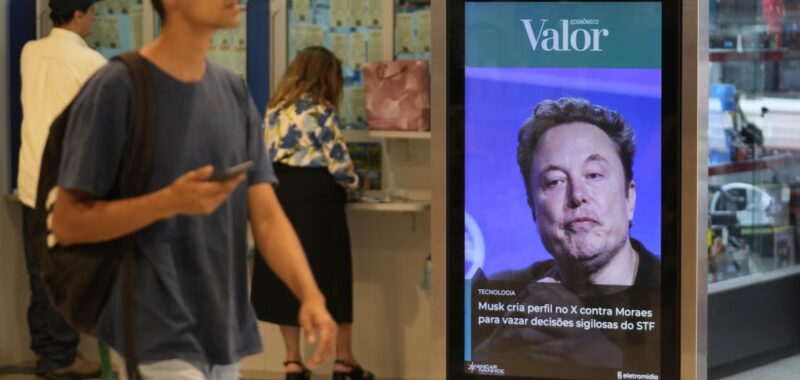SAO PAULO — The Brazilian Supreme Court’s Justice Alexandre de Moraes on Tuesday authorized the restoration of social media platform X´s service in Brazil, over a month after its nationwide shutdown, according to a statement posted on the court’s website.
Elon Musk’s X was blocked on Aug. 30 in the highly online country of 213 million people — and one of X’s biggest markets, with estimates of its user base ranging from 20 to 40 million. De Moraes ordered the shutdown after a monthslong dispute with Musk over free speech, far-right accounts and misinformation. Musk had disparaged de Moraes, calling him an authoritarian and a censor, despite the fact his rulings, including X’s nationwide suspension, were repeatedly upheld by his peers.
Despite Musk’s public bravado, X ultimately complied with all of de Moraes’ demands. They included blocking certain accounts from the platform, paying outstanding fines and naming a legal representative in the country. Failure to do the latter had triggered the suspension.
Just two days before the ban, on Aug. 28, X said it was removing all its remaining staff in Brazil “effective immediately,” saying de Moraes had threatened with arrest its legal representative in the country, Rachel de Oliveira Villa Nova Conceição, if X did not comply with orders to block accounts.
Brazilian law requires foreign companies to have a local legal representative to receive notifications of court decisions and swiftly take any requisite action — particularly, in X’s case, the takedown of accounts. Conceição was first named X’s legal representative in April and resigned four months later, when X shuttered what was left of its office in Brazil. In a twist, the company named her to the same job on Sep. 20, according to the public filing with the Sao Paulo commercial registry.
In an apparent effort to shield Conceição from potential violations by X — and risking arrest — a clause has been written into Conceição’s new representation agreement that she must follow Brazilian law and court decisions, and that any legal responsibility she assumes on X’s behalf requires prior instruction from the company in writing, according to the company’s filing.
Conceição works for BR4Business, a business services firm. Its two-page website provides no insight into its operations or staff. “Something great is on its way,” the top of the site’s main page reads in English. Its other page is an extensive privacy policy.
At three of its listed Sao Paulo offices, building receptionists told the AP that the company’s offices are empty and employees work remotely. Neither Conceição nor BR4Business returned multiple AP phone calls and emails.
There is nothing illegal or suspect about using a company like BR4Business for legal representation, but it shows that X is doing the bare minimum to operate in the country, said Fabio de Sa e Silva, a lawyer and associate professor of International and Brazilian Studies at the University of Oklahoma.
“It doesn’t demonstrate an intention to truly engage with the country. Take Meta, for example, and Google. They have an office, a government relations department, precisely to interact with public authorities and discuss Brazil’s regulatory policies concerning their businesses,” Silva added.
Indeed, it is rare for an established, influential company such as X to have only a legal representative, said Carlos Affonso Souza, a lawyer and director of the Institute for Technology and Society, a Rio-based think tank. And that could be problematic going forward.
“The concern now is what comes next and how X, once back in operation, will manage to meet the demands of the market and local authorities without creating new tensions,” he said.
Some of Brazilian X’s users have migrated to other platforms, such as Meta’s Threads and, primarily, Bluesky. It’s unclear how many of them will return to X.
Bluesky is a lesser-known platform that not only looks and feels very much like the former Twitter, but also grew out of it. The pet project of former CEO Jack Dorsey was supposed to replace it eventually. Locked out of X, Brazilians have started doing their part. Bluesky gained 2.6 million users in the week after Musk’s social media ban, 85% from Brazil, the company said, boosting its total to over 8 million.
In a statement to the AP, the company reported that it now has 10.6 million users in total and continues to see strong growth in Brazil. Bluesky has appointed a legal representative in the South American country.
Brazil was not the first country to ban X — far from it — but such a drastic step has generally been limited to authoritarian regimes. The platform and its former incarnation, Twitter, have been banned in Russia, China, Iran, Myanmar, North Korea, Venezuela and Turkmenistan, for instance. Other countries, such as Pakistan, Turkey and Egypt, have also temporarily suspended X before, usually to quell dissent and unrest.
X’s dustup with Brazil has some parallels to the company’s dealings with the Indian government three years ago, back when it was still called Twitter and before Musk purchased it for $44 billion. In 2021, India threatened to arrest employees of Twitter (as well as Meta’s Facebook and WhatsApp), for not complying with the government’s requests to take down posts related to farmers’ protests that rocked the country.
Musk’s decision to reverse course in Brazil after publicly criticizing de Moraes isn’t surprising, said Matteo Ceurvels, research firm Emarketer’s analyst for Latin America and Spain.
“The move was pragmatic, likely driven by the economic consequences of losing access to millions of users in its third-largest market worldwide, along with the millions of dollars in associated advertising revenue,” Ceurvels said. “Although X may not be a top priority for most advertisers in Brazil, the platform needs them more than they need it.”
___
Ortutay reported from San Francisco

